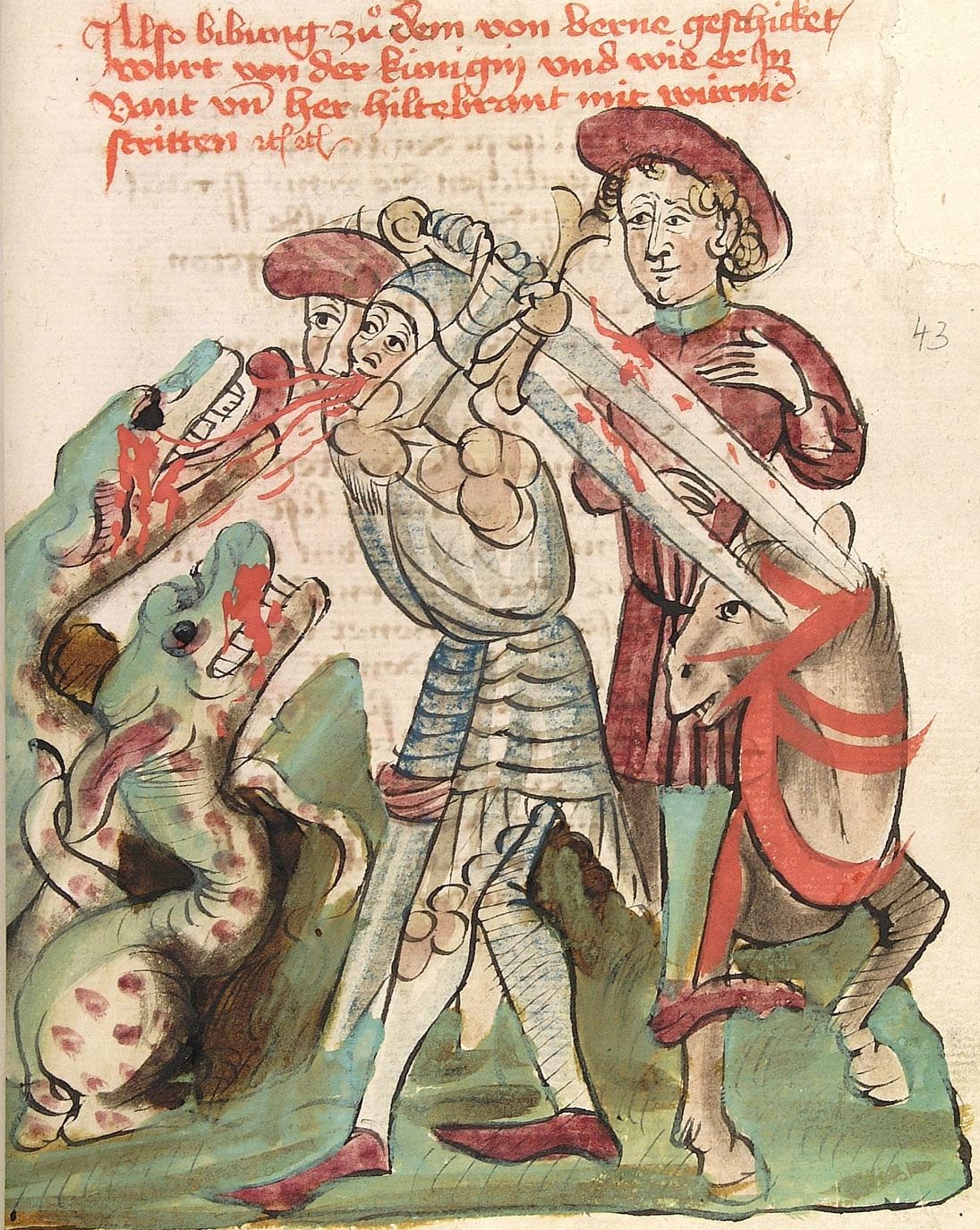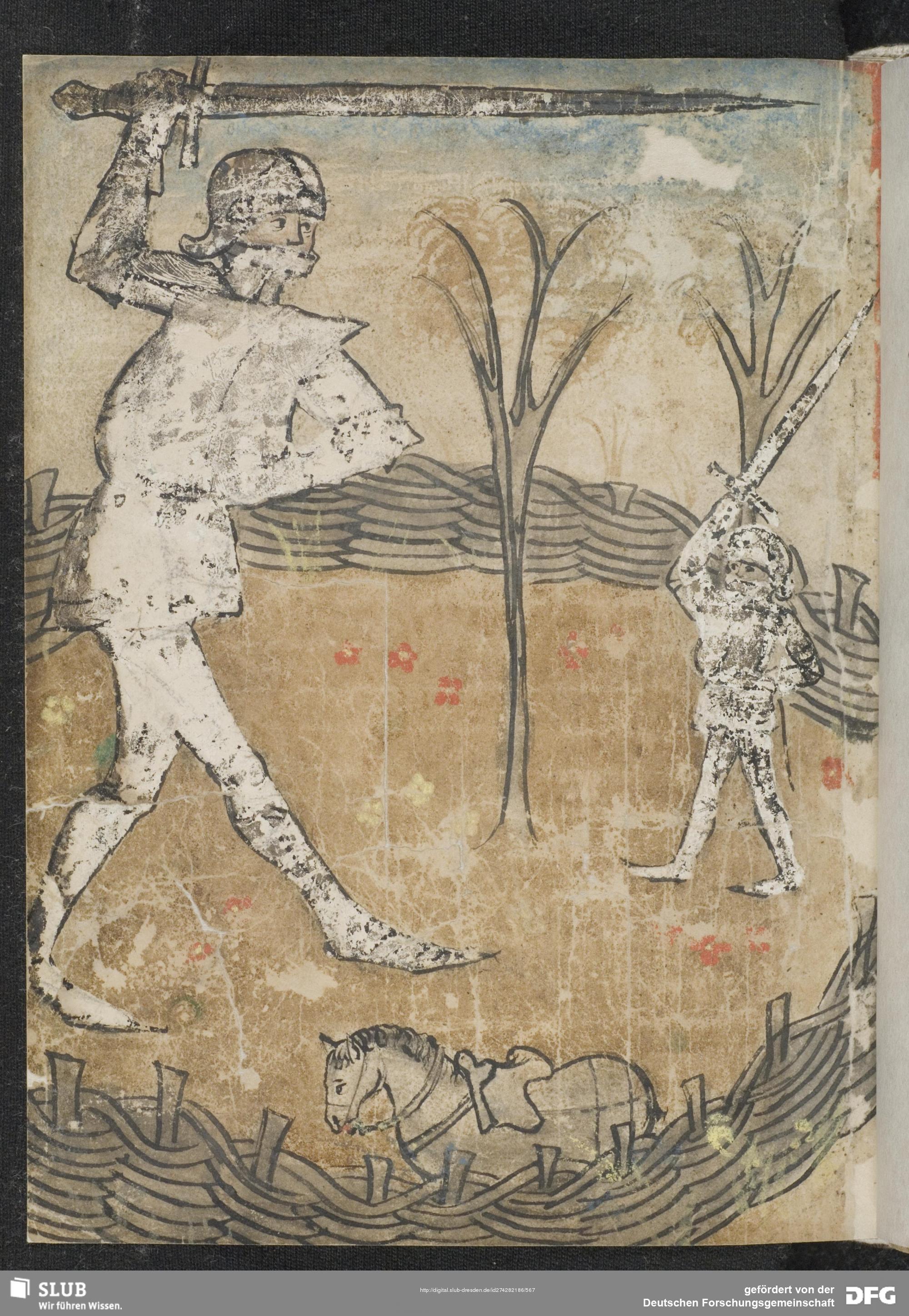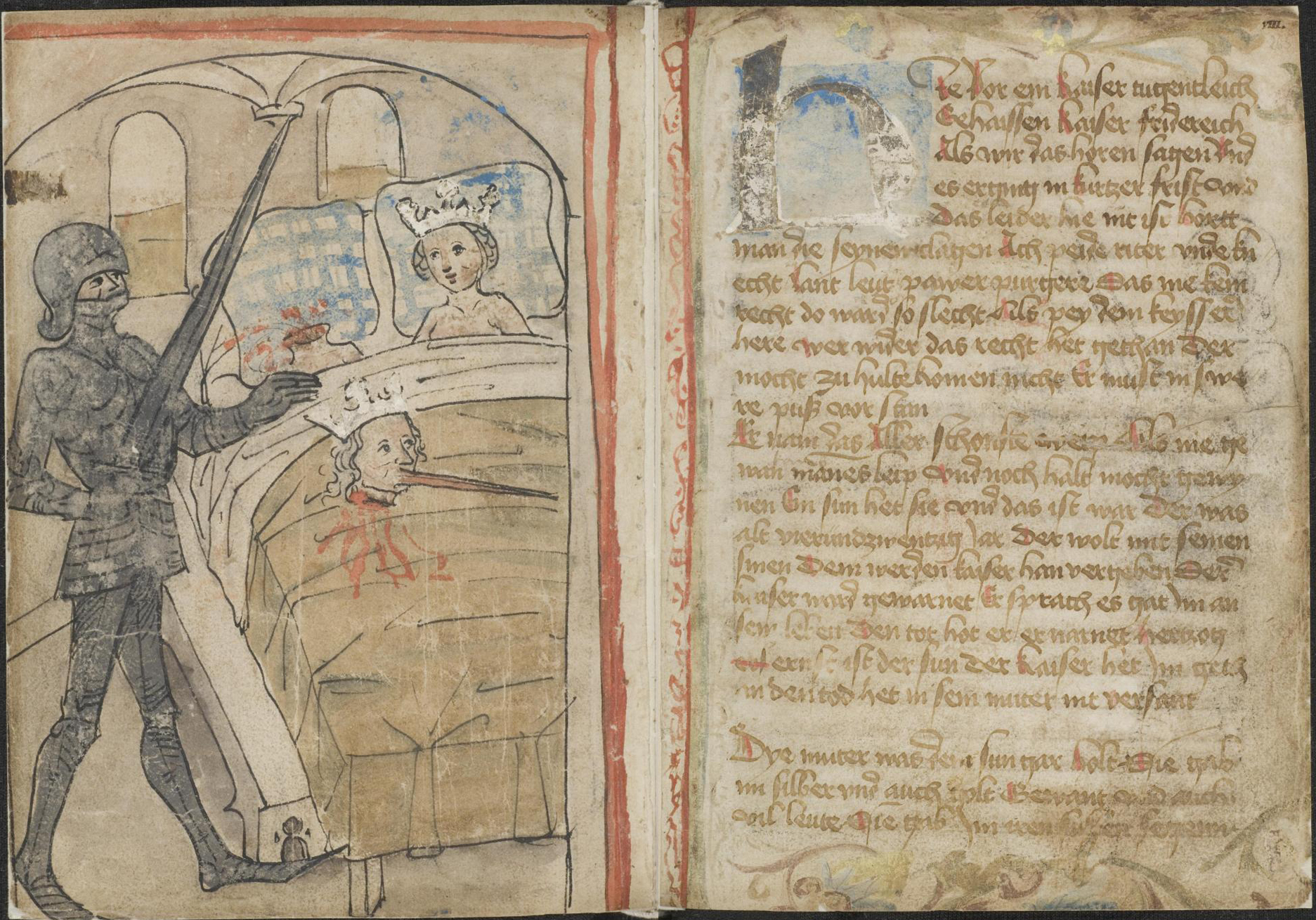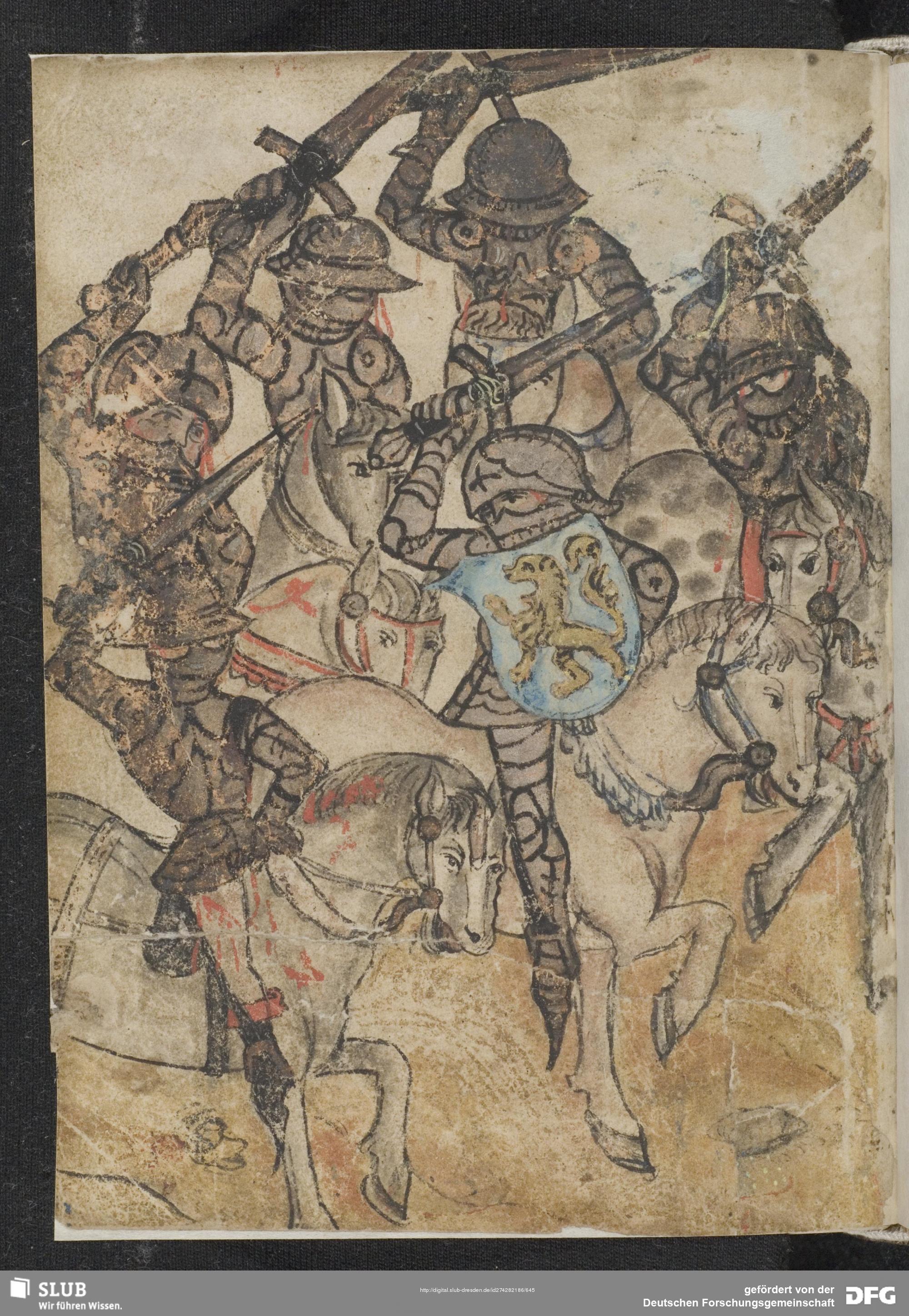|
Wunderer
''Der Wunderer'' (the monster), or ''Etzels Hofhaltung'' (Etzel's holding of court) is an anonymous Early New High German poem about the legendary hero Dietrich von Bern, the counterpart of the historical Ostrogothic king Theodoric the Great in Germanic heroic legend. It is one of the so-called fantastical (''aventiurehaft'') Dietrich poems, so called because it more closely resembles a courtly romance than a heroic epic. The poem may have been written before 1300, but is not attested until the turn of the sixteenth century. The ''Wunderer'' concerns an encounter between a young Dietrich and a monster called the Wunderer while Dietrich is staying at Etzel's court. The Wunderer is hunting and wishes to eat a maiden who later is revealed to be Frau Saelde (Lady Luck). Dietrich defends her from the Wunderer and is blessed after his victory. Summary At a feast being held by Etzel, who is described as a greater king than Arthur, a beautiful maiden appears asking for help against the W ... [...More Info...] [...Related Items...] OR: [Wikipedia] [Google] [Baidu] |
Dietrich Von Bern
Dietrich von Bern is the name of a character in Germanic heroic legend who originated as a legendary version of the Ostrogothic king Theodoric the Great. The name "Dietrich", meaning "Ruler of the People", is a form of the Germanic name "Theodoric". In the legends, Dietrich is a king ruling from Verona (Bern) who was forced into exile with the Huns under Etzel by his evil uncle Ermenrich. The differences between the known life of Theodoric and the picture of Dietrich in the surviving legends are usually attributed to a long-standing oral tradition that continued into the sixteenth century. Most notably, Theodoric was an invader rather than the rightful king of Italy and was born shortly after the death of Attila and a hundred years after the death of the historical Gothic king Ermanaric. Differences between Dietrich and Theodoric were already noted in the Early Middle Ages and led to a long-standing criticism of the oral tradition as false. Legends about Theodoric may have exi ... [...More Info...] [...Related Items...] OR: [Wikipedia] [Google] [Baidu] |
Laurin (poem)
''Laurin'' or ''Der kleine Rosengarten'' (''The Small Rose Garden'') is an anonymous Middle High German poem about the legendary hero Dietrich von Bern, the counterpart of the historical Ostrogothic king Theodoric the Great in Germanic heroic legend. It is one of the so-called fantastical (''aventiurehaft'') Dietrich poems, so called because it more closely resembles a courtly romance than a heroic epic. It likely originates from the region of South Tyrol, possibly as early as 1230, though all manuscripts are later. The poem has five extant versions. In each, it concerns Dietrich's fight against the dwarf King Laurin, which takes place when Dietrich and Witege destroy Laurin's magical rose garden. The heroes are subsequently invited into Laurin's kingdom inside a mountain when it is discovered that Laurin has kidnapped and married the sister of Dietleib, one of Dietrich's heroes. Laurin betrays the heroes and imprisons them, but they are able to defeat him and save Dietleib's sis ... [...More Info...] [...Related Items...] OR: [Wikipedia] [Google] [Baidu] |
Heldenbuch
''Heldenbücher'' (singular ''Heldenbuch'' "book of heroes") is the conventional title under which a group of German manuscripts and prints of the 15th and 16th centuries has come down to us. Each ''Heldenbuch'' contains a collection of primarily epic poetry, typically including material from the Theodoric cycle, and the cycle of Hugdietrich, Wolfdietrich and Ortnit. The ''Heldenbuch'' texts are thus based on medieval German literature, but adapted to the tastes of the Renaissance. Manuscripts The earliest surviving Heldenbuch is a parchment manuscript dating from the first half of the 14th century, which survived only in five fragments (two are now missing). It is variously referred to as the Rheinfränkisches Heldenbuch ("Rhine Franconian Heldenbuch") from its dialect or the ''Berlin-Wolfenbüttel Heldenbuch'' from the location of two of the fragments, and preserves parts of the Eckenlied (E3), Virginal (V3), Ortnit (C) and Wolfdietrich (C), though the fragments do not give any ... [...More Info...] [...Related Items...] OR: [Wikipedia] [Google] [Baidu] |
Virginal (poem)
''Virginal'', also known as ''Dietrichs erste Ausfahrt'' (Dietrich's first quest), or ''Dietrich und seine Gesellen'' (Dietrich and his companions) is an anonymous Middle High German poem about the legendary hero Dietrich von Bern, the counterpart of the historical Ostrogothic king Theodoric the Great in Germanic heroic legend. It is one of the so-called fantastical (''aventiurehaft'') Dietrich poems, so called because it more closely resembles a courtly romance than a heroic epic. The poem was composed by 1300 at the latest, and may have been composed as early as the second quarter of the thirteenth century. There are three principle versions of the ''Virginal''. The poem concerns the still young and inexperienced Dietrich's quest to save the dwarf queen Virginal in Tyrol from a force of attacking heathens. After defeating the heathens, Dietrich encounters a series of further adventures while trying to reach Virginal's court, including, depending on version, his capture by giants ... [...More Info...] [...Related Items...] OR: [Wikipedia] [Google] [Baidu] |
Eckenlied
''Das Eckenlied'' or ''Ecken Ausfahrt'' (The Song of Ecke or Ecke's Quest) is an anonymous 13th-century Middle High German poem about the legendary hero Dietrich von Bern, the counterpart of the historical Ostrogothic king Theodoric the Great in Germanic heroic legend. It is one of the so-called fantastical (''aventiurehaft'') Dietrich poems, so called because it more closely resembles a courtly romance than a heroic epic. The ''Eckenlied'' tells the story of Dietrich's fight against the giant Ecke, who has been sent out by three queens to fetch Dietrich. Dietrich is forced to kill Ecke, after which he must fight Ecke's family, particularly Ecke's treacherous and vengeful brother Fasold. The poem exists in at least three separate but closely related versions, which offer different endings to the tale. A fragmentary text known as ''Dietrich und Fasold'' may represent another version of the ''Eckenlied'', but differences in meter and content make this uncertain. Fasold and the three ... [...More Info...] [...Related Items...] OR: [Wikipedia] [Google] [Baidu] |
Dietrich Und Der Wunderer
Dietrich () is an ancient German name meaning "Ruler of the People.” Also "keeper of the keys" or a "lockpick" either the tool or the profession. Given name * Dietrich, Count of Oldenburg (c. 1398 – 1440) * Thierry of Alsace (german: Dietrich, link=no; 1099–1168), Count of Flanders * Dietrich of Ringelheim (9th century), Saxon count and father of St Matilda * Dietrich Bonhoeffer (1906–1945), German Lutheran pastor and theologian * Wilhelm Dietrich von Buddenbrock (1672–1757), Prussian field marshal and cavalry leader * Dieterich Buxtehude (c. 1637/39–1707), Danish-German composer and organist * Dietrich von Choltitz (1894–1966), German General and last commander of Nazi-occupied Paris in 1944 * Dietrich Eckart (1868–1923), German politician * Dietrich Enns (born 1991), American baseball player * Dietrich Fischer-Dieskau (1925–2012), German baritone singer * Dietrich von Hildebrand (1889–1977), German Catholic philosopher and theologian * Dietrich Hollinderbäum ... [...More Info...] [...Related Items...] OR: [Wikipedia] [Google] [Baidu] |
Romagna
Romagna ( rgn, Rumâgna) is an Italian historical region that approximately corresponds to the south-eastern portion of present-day Emilia-Romagna, North Italy. Traditionally, it is limited by the Apennines to the south-west, the Adriatic to the east, and the rivers Reno and Sillaro to the north and west. The region's major cities include Cesena, Faenza, Forlì, Imola, Ravenna, Rimini and City of San Marino (San Marino is a landlocked state inside the Romagna historical region). The region has been recently formally expanded with the transfer from the Marche region of nine comuni where the Romagnol language is spoken (Casteldelci, Maiolo, Novafeltria, Pennabilli, San Leo, Sant'Agata Feltria, Talamello, Montecopiolo, Sassofeltrio). Etymology The name ''Romagna'' originates from the Latin name ''Romania'', which originally was the generic name for "land inhabited by Romans", and first appeared on Latin documents in the 5th century. It later took on the more specific meaning of " ... [...More Info...] [...Related Items...] OR: [Wikipedia] [Google] [Baidu] |
German Heroic Legends
German(s) may refer to: * Germany (of or related to) **Germania (historical use) * Germans, citizens of Germany, people of German ancestry, or native speakers of the German language ** For citizens of Germany, see also German nationality law **Germanic peoples (Roman times) * German language **any of the Germanic languages * German cuisine, traditional foods of Germany People * German (given name) * German (surname) * Germán, a Spanish name Places * German (parish), Isle of Man * German, Albania, or Gërmej * German, Bulgaria * German, Iran * German, North Macedonia * German, New York, U.S. * Agios Germanos, Greece Other uses * German (mythology), a South Slavic mythological being * Germans (band), a Canadian rock band * "German" (song), a 2019 song by No Money Enterprise * ''The German'', a 2008 short film * "The Germans", an episode of ''Fawlty Towers'' * ''The German'', a nickname for Congolese rebel André Kisase Ngandu See also * Germanic (other) * Germa ... [...More Info...] [...Related Items...] OR: [Wikipedia] [Google] [Baidu] |
Dietrich Von Bern Cycle
Dietrich () is an ancient German name meaning "Ruler of the People.” Also "keeper of the keys" or a "lockpick" either the tool or the profession. Given name * Dietrich, Count of Oldenburg (c. 1398 – 1440) * Thierry of Alsace (german: Dietrich, link=no; 1099–1168), Count of Flanders * Dietrich of Ringelheim (9th century), Saxon count and father of St Matilda * Dietrich Bonhoeffer (1906–1945), German Lutheran pastor and theologian * Wilhelm Dietrich von Buddenbrock (1672–1757), Prussian field marshal and cavalry leader * Dieterich Buxtehude (c. 1637/39–1707), Danish-German composer and organist * Dietrich von Choltitz (1894–1966), German General and last commander of Nazi-occupied Paris in 1944 * Dietrich Eckart (1868–1923), German politician * Dietrich Enns (born 1991), American baseball player * Dietrich Fischer-Dieskau (1925–2012), German baritone singer * Dietrich von Hildebrand (1889–1977), German Catholic philosopher and theologian * Dietrich Hollinderbäu ... [...More Info...] [...Related Items...] OR: [Wikipedia] [Google] [Baidu] |
Hans Folz
Hans Folz ( 1437 – January 1513) was a German author of the late medieval or early Renaissance period. Folz was born in Worms. He was made a citizen of the city of Nuremberg, Germany in 1459 and master barber of the city in 1486. Folz was a reformer of the meistersangs, adding 27 new tones to those that had been allowed by the twelve "Alten Meister" (old masters) up to that point. His ''Meisterlieder'' (a type of song), of which he wrote about a thousand, were mostly devoted to religious questions. He also wrote twelve '' Fastnachtsspiele'' (short plays that made light of people in medieval society, for instance farmers, priests, and the bourgeoisie) in the same style as Hans Rosenplüt, but with more subtle language. Folz has been labelled as an anti-semite by Andrew Gow, who called him "a thorough-going Jew-hater" for his work ''Ein Spil von dem Herzogen von Burgund'' (''A Story of the Dukes of Burgund''). According to Albert Wimmer's ''Anthology of Medieval German Literatu ... [...More Info...] [...Related Items...] OR: [Wikipedia] [Google] [Baidu] |
Play (theater)
A play is a work of drama, usually consisting mostly of dialogue between characters and intended for theatrical performance rather than just reading. The writer of a play is called a playwright. Plays are performed at a variety of levels, from London's West End and Broadway in New York City – which are the highest level of commercial theatre in the English-speaking world – to regional theatre, to community theatre, as well as university or school productions. A stage play is a play performed and written to be performed on stage rather than broadcast or made into a movie. Stage plays are those performed on any stage before an audience. There are rare dramatists, notably George Bernard Shaw, who have had little preference as to whether their plays were performed or read. The term "play" can refer to both the written texts of playwrights and to their complete theatrical performance. Comedy Comedies are plays which are designed to be humorous. Comedies are often filled wit ... [...More Info...] [...Related Items...] OR: [Wikipedia] [Google] [Baidu] |
Nuremberg
Nuremberg ( ; german: link=no, Nürnberg ; in the local East Franconian dialect: ''Nämberch'' ) is the second-largest city of the German state of Bavaria after its capital Munich, and its 518,370 (2019) inhabitants make it the 14th-largest city in Germany. On the Pegnitz River (from its confluence with the Rednitz in Fürth onwards: Regnitz, a tributary of the River Main) and the Rhine–Main–Danube Canal, it lies in the Bavarian administrative region of Middle Franconia, and is the largest city and the unofficial capital of Franconia. Nuremberg forms with the neighbouring cities of Fürth, Erlangen and Schwabach a continuous conurbation with a total population of 800,376 (2019), which is the heart of the urban area region with around 1.4 million inhabitants, while the larger Nuremberg Metropolitan Region has approximately 3.6 million inhabitants. The city lies about north of Munich. It is the largest city in the East Franconian dialect area (colloquially: "F ... [...More Info...] [...Related Items...] OR: [Wikipedia] [Google] [Baidu] |








.jpg)
